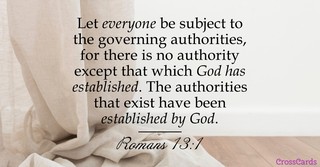
- Recent Translations
- All Translations
Romeinen 13:7
Share
Settings
Images for Romeinen 13:7

Romeinen 13:7 Meaning and Commentary
Render therefore to all their dues
To all princes, magistrates, and officers, that are placed over us, from the supreme governor to the lowest officer under him, should we render as a due debt, and not as a mere gift, whatever belongs to them, or is proper for them for the due discharge of their office, to encourage in it, and support the dignity of it, whether external or internal:
tribute to whom tribute is due, custom to whom custom.
These two words include all sorts of levies, taxes, subsidies and the former may particularly design what is laid on men's persons and estates, as poll money, land tax and the latter, what arises from the exportation and importation of goods, to and from foreign parts:
fear to whom fear;
not of punishment; for a good subject has no reason to fear the civil magistrate in this sense, only the man that does evil, the malefactor; as for the good neighbour, citizen, and subject, he loves the magistrate the more, the more diligent he is in putting the laws in execution against wicked men; but this is to be understood of a fear of offending, and especially of a reverence bore in the mind, and expressed by outward actions, and such as has going with it a cheerful obedience to all lawful commands:
honour to whom honour;
there is an honour due to all men, according to their respective rank and station, and the relation they stand in to each other; so servants are to honour their masters, children their parents, wives their husbands, and subjects their princes; all inferior magistrates are to be honoured in their place, and more especially the king as supreme, in thought, word, and gesture; see ( 1 Peter 2:17 ) .
